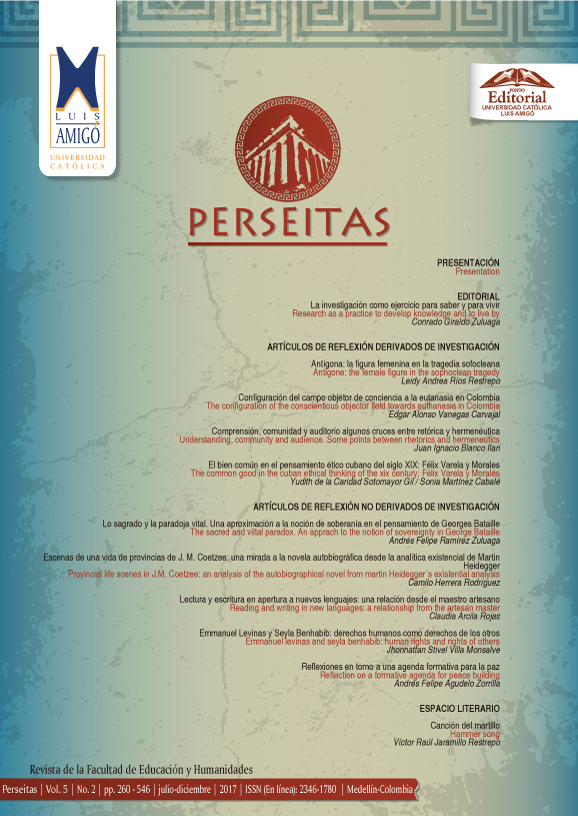Understanding, community and audience. Some points between rhetorics and hermeneutics
DOI:
https://doi.org/10.21501/23461780.2421Keywords:
Understanding, Community, Audience, Rhetoric, HermeneuticsAbstract
This paper develops one of the points in which hermeneutics and rhetoric come
into contact. This common point has been revitalized in the last years and has
been unanimous. We refer to the relation that both rhetoric and hermeneutics
establish between understanding and the community it belongs to. The concept
of audience (axial for rhetoric) and the concept of the hermeneutic circle (axis of
contemporary hermeneutic) highlight the same idea: in order to understand an
argument and be able to establish a communicative interaction, one must be
part of the same community of competent speakers. This paper presents this
process in three phases: the first one describes the adversary under both
perspectives develop their notions; then, there is the relevance of the concept of
audience in hermeneutics, and finally, the articulation of the concept of the
hermeneutic circle from an ontological perspective. The conclusions try to
emphasize some questions and open some problems.
Downloads
References
Agamben, G. (2007). Infancia e historia. Buenos Aires, Argentina: Adriana Hidalgo Editora.
Arendt, H. (2002). La vida del espíritu. Buenos Aires, Argentina: Paidós.
Arendt, H. (2008). La promesa de la política. Barcelona, España: Paidós.
Aristóteles, (1988), Política, (Trad. García Valdés). Madrid, España: Gredos.
Aristóteles. (1985). Ética a Nicómaco. Madrid, España: Gredos.
Beuchot, M. (1998). La retórica, entre pragmática y hermenéutica. Barcelona, España: Antrophos.
Eggers Lan, C., y Juliá, V. E. (Eds.). (1981). Los filósofos presocráticos (Vol. 1). Madrid, España: Gredos.
Gadamer, H. -G. (1990). Verdad y método (Tomo 1). Salamanca, España: Sígueme.
Gadamer, H. -G. (1995). El giro hermenéutico. Madrid, España: Cátedra.
Gadamer, H. -G. (1998). Verdad y método (Tomo 2). Salamanca, España: Sígueme.
Gadamer H-G, (2003), Verdad y Método. Salamanca, España: Sígueme.
Grassi, E. (1999). Vico y el humanismo. Barcelona, España: Antrophos.
Grondin, J. (1999). Introducción a la hermenéutica filosófica. Barcelona, España: Herder.
Grondin, J. (2008). Qué es la hermenéutica. Barcelona, España: Herder.
Heidegger M. (2005), La idea de filosofía y el problema de la concepción del mundo. Lecciones del semestre de invierno 1919. Barcelona. Herder.
Heidegger, M. (1997). Ser y tiempo. Santiago de Chile, Chile: Editorial Universitaria.
Ijsseling, S. (1976). Rhetoric and philosophy in conflict. The Hague,
Netherlands: Martinus Nijhoff.
Lakoff, G. y Johnson, M. (2004). Metáforas de la vida cotidiana. Madrid, España: Cátedra.
Meyer, M. (2013). Principia rhetorica. Buenos Aires, Argentina: Amorrortu.
Perelman, Ch. (1963). The idea of justice and the problem of argument. London, Inglaterra: Routledge and Kegan Paul.
Perelman, Ch. (1997). El imperio retórico: retórica y argumentación. Bogotá, Colombia: Norma.
Perelman, Ch. y Olbretchs-Tyteca, L. (2000). Tratado de la argumentación: la nueva retórica. Madrid, España: Gredos.
Platón. (1987). Gorgias. Madrid: Gredos.
Platón, (1988). Diálogos III): Fedón, Banquete, Fedro (Trad. Gual-Hernández- Lledó. Madrid, España: Gredos.
Quintiliano (1942) Instituciones Oratorias (trad. Rodríguez-Sandier). Madrid, España: Hernando.
Ricoeur, P. (1990). Lectures 2. Paris, Francia: Seuil.
Ricoeur, P. (2002). Del texto a la acción. México, Estados Unidos Mexicanos: FCE.
Ricoeur, P. (2003). El conflicto de las interpretaciones. Ensayos de
hermenéutica. Buenos Aires, Argentina: FCE.
Schaeffer, (2004) Commonplaces: Sensus Communis. En Jost, W y
Olmsted,W (Eds.), Rhetoric and Rhetorical Criticism. Blackwell
Publishing: Oxford
Winch, P. (1990). Ciencia social y filosofía. Buenos Aires: Amorrortu.
Yunis, H. (2005). Eros in Plato´s Phaedrus and the Shape of Greak rhetoric. Arion, 13(1), 101-113. Recuperado de
Downloads
Published
How to Cite
Issue
Section
License
La revista y los textos individuales que en esta se divulgan están protegidos por las leyes de copyright y por los términos y condiciones de la Licencia Creative Commons Atribución-No Comercial-Sin Derivar 4.0 Internacional.
















